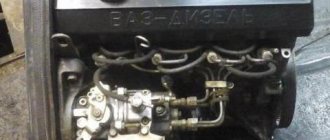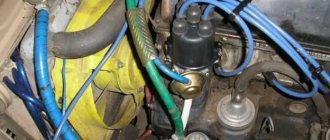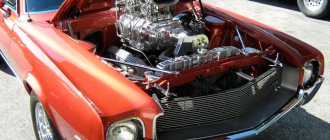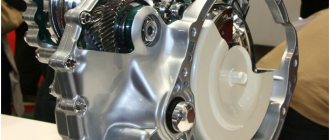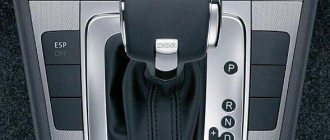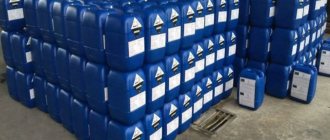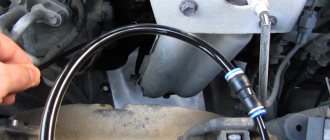As the name suggests, diesel fuel is used in diesel engines. It is produced by direct distillation of oil from kerosene-gas oil fractions of gas condensate fields. People call this fuel “diesel oil” or “diesel fuel”. Let's find out how diesel differs from gasoline, which fuel is better, and why winter diesel fuel does not freeze?
Stages of gasoline production
Gasoline is produced by fractional distillation of crude oil. In the distillation column, the liquid is exposed to high temperatures. As a result, substances that are lighter evaporate and flow upward, from where they are pumped out through special outlet pipes. The separated fraction is treated with catalysts, acids and adsorbents, which help clean the fuel from heavy and harmful impurities.
At the last stage of production, additives are added to the finished fuel to regulate its ignition rate.
This prevents damage to the motor and accidents when working with liquid.
The quality of gasoline fuel can be determined by checking the octane number.
Diesel vs gasoline - which is better in winter?
No matter how much they scold the domestic gasoline-powered auto industry, even it looks more attractive than luxury diesel cars. For the latter, at -15..-20 degrees, the diesel fuel turns into a gel-like state, and it becomes difficult to start the engine. The car owner is forced to switch to a winter fuel option, use a heating system (for example, a Webasto pre-heater found on special equipment) or use expensive oils with additives that still need to be selected correctly.
Diesel vs gasoline - which is better in winter? Definitely gasoline. Its operation in the cold season is more reliable, cheaper, and causes less trouble.
What is diesel fuel
Diesel fuel (DF) belongs to the middle fractions of oil. It consists of alkane compounds containing 13-19 hydrocarbon groups. In everyday life, the word “diesel fuel” is common, which is considered synonymous with diesel fuel, but these 2 types of fuel differ in density, viscosity and boiling point.
DF consists of gas oils. To improve the quality of the mixture, lighter kerosene fractions can be added to it. Their share in fuel reaches 20%.
A feature of diesel fuel is a sharp change in fluidity with decreasing temperature. When using diesel fuel, it is necessary to fill in a grade that corresponds to the climatic conditions of the region.
What is better diesel or gasoline? Difference in repair
Not a single engine is immune from global breakdown. But what is the difference between diesel and gasoline? They equally require care during operation, but more will be spent on maintaining the functionality of the first one. In a diesel internal combustion engine, filters and oils are changed twice as often; when the mileage exceeds 200 thousand km, the injectors or fuel pump “die,” which sometimes costs over 50 thousand rubles. Not to mention how much a major refurbishment of the unit will cost.
For the money spent on servicing a diesel engine, you can completely update consumables and overhaul a budget gasoline car. However, this figure pales in comparison to fuel efficiency and routine maintenance. In addition, having repaired the unit once, you can forget about its suitability for many years.
It is impossible to say unequivocally that gasoline or diesel is better for a crossover - a lover of economy will prefer the first option, and a connoisseur of quality will choose the second at the expense of finances. In terms of repair complexity, both types of motors are equal. Previously, diesel presented difficulties, but with the introduction of the Common Rail fuel supply system, they sank into oblivion. Auto mechanics have adapted to it.
However, you need to understand that a lot depends on the design of the car itself. Therefore, we recommend that you familiarize yourself with the rating of the most reliable cars.
How petrol and diesel engines work
Gasoline and diesel engines are internal combustion engines. In an internal combustion engine running on light oil, the fuel-air mixture is formed in a manifold, which is located directly in front of the cylinder. At the final point of compression, fuel vapors combine with air and are evenly distributed throughout the volume of the cavity. The temperature of the mixture at maximum pressure is +500°C. It is ignited by a spark from the spark plug.
In a diesel engine, air compression occurs directly in the cylinders. The gas pressure is 30-50 atmospheres, so spare parts are made more durable and heavier. Due to strong compression, the air temperature rises to +900°C. At the final point of the process, heavy fuel is sprayed from the nozzles.
When interacting with hot gas, its droplets quickly evaporate and a mixture is obtained that is capable of self-ignition. Thus, diesel fuel burns without the participation of spark plugs.
A detailed comparison of two major South Korean car manufacturers. We figure out what is better than Kia or Hyundai, compare characteristics, appearance, cost, operating features and much more.
A detailed overview of the quality of gasoline at gas stations of the most popular gas stations. Let's figure out which gasoline is worth filling, and which will quickly render the fuel system unusable.
The difference between diesel and gasoline is engine power and fuel consumption
The compression ratio of diesel is almost 2 times higher than that of gasoline, and therefore its efficiency is greater. The fuel mixture is regulated evenly, and as the speed increases, the amount of incoming diesel fuel also increases. However, at maximum speed, if we compare two units with the same displacement, the amount of injected diesel will be 30-50% less. Therefore, two cars of the same brand, different diesel and gasoline engines of the same size, can have significant differences in power.
It is difficult to say unequivocally that gasoline or diesel is better for a car. If the car owner is a supporter of the roar of the engine, a diesel engine will suit him. If you like to save money - a gasoline internal combustion engine.
If you have chosen a car with a gasoline engine, we recommend that you familiarize yourself with the current cost of gasoline in Russia.
What happens if you mix gasoline and diesel?
Mixing 2 types of fuel leads to increased engine wear. If gasoline gets into a diesel engine, the vehicle will quickly stall, because... An ignition spark is required to ignite the mixture. If the car is only partially filled with light fuel, this may not stop the engine, but can lead to overheating of the fuel system and metallic knocking in the engine.
In the opposite situation - diesel fuel gets into the gas tank - the heavy fraction quickly sinks to the bottom and, thus, immediately enters the fuel supply system. The engine loses power and dynamics, and begins to grind and knock. Black smoke comes out of the exhaust pipe. If diesel is the predominant type of fuel, the car will stall within a few minutes, because... the temperature from the compression of the liquid and the spark are not enough to ignite diesel fuel.
When mixing oil fractions, you will need to completely drain the liquid from the tank and flush the supply system with a large amount of the required fuel.
These types can be distinguished by the rate of evaporation and combustion. When immersed, diesel fuel envelops the surface of the object with an oil film that does not disappear over time. In turn, the low-temperature oil fraction quickly forms vapor. Some car enthusiasts also note that gasoline has a stronger odor.
What is better diesel or gasoline? Background
At the end of the 20th century, a small part of citizens knew about the production of diesel engines in the USSR, since most of the products were exported.
Those that remained in their homeland were used for public transport or special equipment - on buses, combines, trucks, etc. Today this prejudice has sunk into oblivion. Diesels are sold, albeit 3-4 times worse than gasoline internal combustion engines, but much more often than in the last century. There are many reasons for this. But first, let’s look at how diesel is similar and different from gasoline in action.
Difference between petrol and diesel engines
Types of internal combustion engines differ in their operating features, power, degree of safety and reliability. Most of these parameters affect the cost of car maintenance and repair.
Exploitation
Differences in the operation of motors are observed in the following aspects:
- Acceleration depending on crankshaft speed. At minimum speeds, a diesel engine produces much more torque than a gasoline engine. Good traction at idle improves maneuverability on rough roads and off-road conditions. Light fuel engines have a wide range of operating speeds. This results in a gain in speed and less wear on the internal combustion engine when driving fast.
- Power (number of horsepower). In terms of dynamics, diesel engines are significantly inferior to gasoline models.
- Resistant to water. Due to the lack of an ignition system, the diesel engine does not suffer from interruptions in high humidity. At the same time, it is more sensitive to water entering the combustion chamber and crankcase.
- Maintenance. Diesel engines require regular inspection at a service station. The permissible service mileage for them is much less than for gasoline engines. In addition, the owner will have to monitor the condition of the systems more often, change the oil and filters.
Features of operation in the cold season
When choosing fuel, you need to pay attention to its climate type. It reflects the temperature at which the fuel viscosity increases. Summer diesel begins to thicken already at -10...-15°C, so the car will not start in cold weather.
To avoid problems with starting, before the start of the winter season, it is advisable to drain all summer fuel and fill the car with the most liquid and frost-resistant type of diesel fuel - “Arctic”.
After this, you can drive a standard winter diesel engine.
Vibrations and noises
Since heavy engines operate on the principle of compression, noise and vibration on such units will be significantly higher. This disadvantage is compensated for by a more thorough insulation system in the cabin.
Safety
Cars running on diesel fuel are less likely to catch fire during accidents. This is due, first of all, to the slow evaporation of the oily liquid and the absence of high-voltage wires of the ignition system.
Environmental friendliness
The diesel engine has low carbon monoxide (CO) emissions and high nitrogen oxide (NO) and particulate emissions. This is due to the efficient combustion of fuel in the operating cycle.
If previously diesel fuel was considered more environmentally friendly, today strict European standards are demanding for engines of any type.
Diesel engines without reliable exhaust filtration systems or that do not undergo regular maintenance are especially dangerous.
Modern diesel engines are equipped with urea catalysts, which reduce NO to nitrogen, and particulate filters, which purify exhaust gases.
Financial side of the issue
Heavy engines are rarer, so their maintenance and repair are more expensive, and it is more difficult to find a specialist and spare parts for them. The initial cost is also higher than for gasoline-powered cars.
Power and fuel consumption
The advantage of diesel is high torque, relatively fast acceleration and low fuel consumption.
The difference in fuel consumption per 100 km is at least 1.5-2 liters, depending on the total displacement of the internal combustion engine.
In terms of power, in most cases, motors running on low-temperature oil fraction win.
Used cars
Diesel vehicles are more reliable, durable and durable. Purchasing a used car can be a good deal if the buyer is confident in the seller's integrity and regular maintenance.
In addition, diesel-powered vehicles lose less value during operation.
Demanding on fuel quality
Another difference between a diesel engine is its high demands on the composition of the fuel. When using high-quality oil fraction, heavy motors are more durable than light ones, because designed for increased loads. However, irregular maintenance and a large amount of impurities can quickly damage them.
Advantages and disadvantages
The pros and cons of engines using various oil fractions are presented in the table below.
| Fuel type | Advantages | Flaws |
| Dis. |
|
|
| Benz. | Spare parts and maintenance are cheaper due to their prevalence | Higher fuel consumption |
Which engine is better: diesel or gasoline?
Both types of internal combustion engines are four-stroke, i.e. their work is divided into 4 cycles:
- injection of fuel fluid into the cylinders;
- mixture compression;
- ignition of the mixture;
- exhaust (exhaust gas outlet).
The operating principle of the engines differs only at the third stage: gasoline is ignited by an electric spark, and diesel is ignited due to the high temperature of pre-compressed air.
Here lies the main difference between diesel and gasoline - its spark plugs are replaced with glow plugs. It also has a higher compression ratio - up to 25 units versus 10-12 for gasoline. Since the combustion chamber (and the entire internal combustion engine) experiences greater stress, its parts must be stronger. The crank mechanism is structurally the same for both engines. But in diesel fuel (another name for diesel), due to the high pressure in the combustion chamber, the pistons are equipped with an additional sealing ring.
The consequence of the differences is the heavier weight of the diesel engine, which affects cost, operation, service life and much more.
Comparison of gasoline and diesel on different crossover models
Diesel engines are used primarily for SUVs, which have high fuel consumption. In addition to jeeps, there are also several versions of heavy fuel minivans - for example, Citroen Grand C4 Picasso and Volkswagen Caddy.
In most cases, the model is produced in two versions (diesel and gasoline), which allows you to compare the benefits and costs of owning a car.
Citroen Grand C4 Picasso
The minivan from the French manufacturer is available on the Russian market in 3 versions: with gasoline engines of 120 and 150 horsepower (hp) and with a turbodiesel of 115 hp.
| Comparison parameter | Dis. | Benz. |
| Engine volume, l | 1,6 | |
| Torque (N*m) | 270 | 160-240 |
| Acceleration time to 100 km/h, seconds | 11.2-12.6 (depending on modification) | 9,3-12,6 |
| Certified fuel consumption per 100 km, l | 3,8-4,3 | 6,4-7,5 |
| Cost, rub. | From 1.1 million | 1 million |
| Maintenance costs per 100 thousand km (frequency - once every 15 thousand km), rub. | From 60 thousand | From 45 thousand |
With an average cost of gasoline (AI-95) of 44 rubles/l, and diesel fuel - 43 rubles, savings on fuel for every 100 thousand km will amount to 131.7 thousand rubles. Taking into account the higher cost of annual maintenance, the owner will be able to save about 116 thousand rubles.
KIA Sportage
The compact crossover of the South Korean manufacturer is sold in several configurations. The power of a car on light fuel is 150-185 hp, on diesel fuel - 185 hp.
| Comparison parameter | D. | B. |
| Engine capacity | 2 | 2-2,4 |
| Maximum speed Acceleration speed to 100 km/h, seconds | 201 km/h 9,5 | 180 km/h 11,8 |
| Moment (N*m) | 400 | 192 |
| Certified fuel consumption, l | 6,3 | 8,3 |
| Cost, rub. | 1.8-1.9 million | 1.7-1.8 million |
| Maintenance costs per 100 thousand km, rub. | From 60 thousand | From 50 thousand |
The benefit from owning a KIA Sportage on diesel fuel, taking into account maintenance and refueling, is about 85 thousand rubles.
Hyundai Tucson
The Korean crossover Hyundai Tucson is available with 2 types of engines. In the diesel version, its power is 185 hp, and in the gasoline version - 177 hp.
| Comparison parameter | D. | B. |
| Engine volume, l | 2 | 1,6 |
| Maximum speed Acceleration time to 100 km/h, seconds | 201 km/h 9,5 | 201 km/h 9,1 |
| Torque, N*m | 400 | 265 |
| Fuel consumption, l | 6,5 | 7,7 |
| Cost, rub. | 1.7-1.8 million | From 1.65 million |
| Maintenance costs per 100 thousand km, rub. | From 117 thousand | From 106 thousand |
Savings per 100 thousand km will be no more than 48-50 thousand rubles.
Nissan Qashqai
The popular Japanese-made crossover is equipped with a 130 hp turbodiesel. or one of 2 light fuel engines - 1.2 liters and 115 hp. or 2 liters and 144 hp.
| Comparison parameter | D. | B. |
| Engine volume, l | 1,6 | 1,2 and 2 |
| Acceleration speed to 100 km/h, seconds | 11,1 | 10,1 |
| Torque, N*m | 320 | 200 |
| Fuel consumption, l | 4,9 | 6,9 |
| Cost, rub. | From 1.43 million | From 1.4 million |
| Maintenance costs per 100 thousand km, rub. | From 53 thousand | From 57 thousand |
Low fuel consumption will save up to 90 thousand rubles. over 100 thousand km of travel. This offsets the higher purchase and maintenance costs.
Renault Duster
Renault Duster is a popular crossover, which is available in 2 modifications running on gasoline and one diesel version. The power of models with light fuel is 102 and 135 hp, and with heavy fuel - 90 hp.
| Comparison parameter | D. | B. |
| Engine volume, l | 1,5 | 1.6 and 2 |
| Maximum speed Acceleration time to 100 km/h, seconds | 167 km/h 13,2 | 166 km/h 12,5 |
| Torque, N*m | 240 | 156 |
| Fuel consumption, l | 5,3 | 7,6 |
| Cost, rub. | From 905 thousand | From 820 thousand |
| Maintenance costs per 100 thousand km, rub. | From 103 thousand | From 86 thousand |
Savings per 100 thousand km amount to more than 106 thousand rubles.
Nissan X-Trail
The second Japanese crossover is available with a 130 hp turbodiesel. or light fuel engines with 141 hp. and 171 hp
| Comparison parameter | D. | B. |
| Engine volume, l | 1,6 | 2 |
| Maximum speed Acceleration speed to 100 km/h, seconds | 186 km/h 11 | 180 km/h 12 |
| Torque, N*m | 320 | 200 |
| Certified fuel consumption, l | 5,3 | 7,5 |
| Cost, rub. | From 1.67 million | From 1.7 million |
| Maintenance costs per 100 thousand km, rub. | From 55 thousand | From 50-53 thousand |
The benefit from owning a car on diesel fuel is more than 100 rubles. for every kilometer of road.
Volkswagen Caddy
The “heeled” minivan is equipped with a 2-liter diesel engine producing 110 hp. or one of the 1.2 liter gasoline engines with a power of 105 and 86 hp.
| Comparison parameter | D. | B. |
| Volume, l | 2 | 1,2 |
| Fuel consumption, l | 4,7-6,9 | 6-8,1 |
| Acceleration time to 100 km/h, seconds | 10-16.4 (depending on drive) | 10,3-12,5 |
| Torque, N*m | 250-320 | 155-220 |
| Cost, rub. | 900 thousand | 852 thousand |
| Maintenance costs per 100 thousand km, rub. | From 45 thousand | From 37 thousand |
Thus, diesel is a more profitable type of fuel. However, when repairing and servicing a car over a long mileage, the financial advantage can be compensated at a time.
How does diesel fuel differ from gasoline: the issue of interchangeability and benefits for the driver
Although the production of electric vehicles is gaining momentum, gasoline and diesel cars are still in great demand.
Accordingly, when you plan to buy a car, you need to understand which engine to give preference to. After all, everything else about the cars is almost the same: a comfortable interior, a modern beautiful body, and so on. In this article we will try to help you make a choice by touching on the topic: how does diesel differ from gasoline. And why can you sometimes hear the name “diesel oil”. Let's talk about the difference between engines designed for different fuels. Let's start by defining the types of fuel.
- Gasolines contain no more than 12 carbon atoms. This makes the fuel easily evaporate.
- Diesels are petroleum products that have from 12 to 36 carbon atoms. This makes the fuel more oily.
- Diesel fuel is the second, common name for diesel fuel. However, diesel cannot be called that, since diesel fuel has a different chemical composition and has an even heavier structure than diesel. Real diesel fuel is not suitable for a diesel engine.
Diesel, gasoline, and diesel fuel are produced from crude oil in accordance with GOST standards. It cannot be said that some fuel is better and some is worse. All types are suitable for engines created for them and are in massive demand.
This is interesting!
The name "gasoline" is not Russian. The word is borrowed from the French language "benzine" and means "benzene". In turn, the word “benzene” was borrowed by the French from the Arabs and was understood as “wood incense”.
The name “diesel” comes from the name of the mechanical scientist who invented the engine. Rudolf Christian Karl Diesel created the mechanism in 1897, and in 1898 the engine was put on the assembly line. Diesel fuel has been improved for this engine.
The name “diesel oil” comes from the German word “solaröl” and means “sun oil”. It was produced much earlier than the invention of the diesel engine - in 1857.
Confusion with the names of diesel fuel and diesel occurred in people's minds due to the USSR regulatory document “Solar oil GOST 1666–42 and GOST 1666–51.” This standard is no longer valid.
Comparison of gasoline and diesel engines in passenger cars
Heavy engines are rarely installed in passenger cars. This is due to the fact that the benefits of saving fuel on small cars do not compensate for expensive maintenance and problems with finding original spare parts.
Skoda Octavia
The Czech subcompact Skoda Octavia is sold with various engine and drive options. Depending on the year of manufacture, type of fuel and configuration, the machine’s power ranges from 80 to 230 hp.
| Comparison criterion | Dis. | Benz. |
| Engine volume, l | 2 | 1,4 |
| Acceleration to 100 km, seconds | 8,7-12,9 | 6,8-14,3 |
| Torque, N*m | 250-320 | 155-350 |
| Fuel consumption, l | 4,3-6,4 | 4,7-6,4 |
| Price | From 960 thousand rubles. | From 860 thousand rubles. |
| Maintenance costs per 100 thousand km (frequency - once every 15 thousand km) | From 50 thousand rubles. | From 45 thousand rubles. |
Savings per 100 thousand km will be no more than 10-20 thousand rubles.
Citroen C4
The Citroen passenger car model is equipped with engines of the same volume.
| Comparison parameter | Dis. | Benz. |
| Engine volume, l | 1,6 | |
| Maximum speed | 187 km/h | 188 km/h |
| Torque, N*m | 270 | 150 |
| Certified fuel consumption, l | 4,8 | 6,6 |
| Cost, rub. | From 1 million | From 900 thousand |
| Maintenance costs per 100 thousand km | From 171 thousand rubles. | |
For 100 thousand km, the owner will be able to save more than 83 thousand rubles on fuel.
The difference between diesel and gasoline in maintenance
Why is diesel more expensive than gasoline if its maintenance also costs more? There are several reasons:
- There are 4-5 times fewer service stations servicing diesel engines, and mechanics deliberately raise the cost;
- Passenger cars are rarely equipped with diesel engines, the repairs of which are by definition cheaper;
- the established trend is that diesel is a feature of trucks and buses (which are also more expensive to repair).
What to choose - gasoline or diesel? The service interval for the first is from 15 to 20 thousand kilometers, for the second - 8-10 thousand. Oils are more expensive for them, as are consumables. From the point of view of regular maintenance, gasoline is a clear winner.
Recommendations for selection
Comparing the cost and expenses of a car is a good opportunity to evaluate the advantages and disadvantages of engines in quantitative terms. It is recommended to choose a gasoline model in the following cases:
- for trips within city limits;
- with a small engine volume;
- for driving at high speeds.
Cars with diesel engines can withstand off-road travel better, but the owner will have to more carefully monitor the condition of the fuel filters and undergo maintenance at the frequency recommended by the manufacturer. The higher cost of the car will be paid off by fuel savings in 3-5 years.
Which car is more appropriate for you to buy - diesel or gasoline?
- The most powerful car engine
- Which engine is the most reliable?
- The best diesel engines for passenger cars
- The difference between antifreeze and antifreeze, which is better?
- Oil additives for engine restoration
Which is better: diesel or gasoline? Car noise
A diesel engine is noisier than its gasoline counterpart. This is due to the weight of the structure and the strong pressure difference before and after ignition. Engine noise is a problem for budget cars; took care of the car owner and passengers by installing high-quality sound insulation.
For some users, “more powerful” means louder. They deliberately buy noisy diesel engines to attract attention. But what is better for an SUV - gasoline or diesel? Of course, a motor running on diesel fuel. This is especially true for vehicles operated with heavy loads or off-road - only with a diesel engine can they meet the car owner’s expectations.
What happens if you pour kerosene into a diesel engine?
Therefore, adding kerosene to diesel fuel leads to a decrease in the cetane number of the resulting mixture and, as a consequence, to a deterioration in engine starting in cold weather. Deterioration of the lubricity of diesel fuel.
Interesting materials:
The founder has left the membership, what should I do? The snail is clogged, what should I do? Store sales have fallen, what should I do? Strawberries have mustaches, what should you do with them? Fired due to staff reduction, what should I do? What is the effect of operating leverage? What is the biological effect of ionizing radiation? What is the principle of protective grounding? What is the significance of the operation of a single criminal code throughout Russia? In which tree does a squirrel make a hollow?
Throttle function
The throttle valve is present in any intake system. It is located between the intake manifold and the air filter and regulates air flow. But there is a significant difference in why it is needed in gasoline and diesel engines.
In a nutshell: in a gasoline engine, the throttle valve always works, thanks to it, fuel combustion occurs in the cylinders. In a diesel engine, the throttle shuts down the internal combustion engine and helps environmental systems.
Spark plugs and glow plugs
The use of spark plugs and glow plugs depends on the chemical properties of the fuel. The spark plug produces an electric arc—a spark—that ignites a mixture of gasoline and air in the cylinders.
Diesel does not burn from an open fire: it must be mixed with air, heated and compressed. The glow plug heats the fuel at the time of injection. Ignition occurs independently upon compression; There is no need to ignite the air-fuel mixture.
To summarize:

